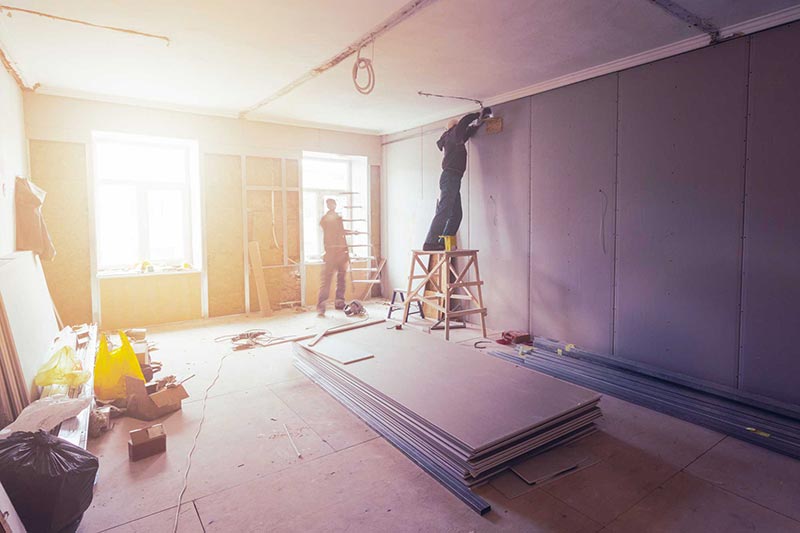
What to Look for When Buying a Newly Built Home
Colorado home buyers considering buying a newly built home should know that defects are common, and those defects can pose immediate problems.
Denver’s population growth, in particular, has even spurred legislators to overhaul the state’s construction-defects law.
New doesn’t mean perfect. In fact, it’s a good idea to have a new home inspected by a private inspector to ensure that serious hazards are resolved or properly mitigated.
Below, the experts at Professional Restoration help home buyers avoid water management defects and common fire safety hazards.
Water Management Defects
If water management systems have been ignored or poorly designed, even a new home can’t fight a flood.
Take a look at the roof design. Where is the water supposed to go? Are rain gutters installed? They should be.
Roofs without gutters or with poor flow design often concentrate water in a single area, which is likely to cause problems—especially if the water is directed near the house and not away from it.
Downspouts should move water away from the house not into plant beds or over a sidewalk. Underground drains are inexpensive and effective, but only if water management is addressed before sidewalks and driveways get poured.
Next, confirm that all poured concrete (sidewalks, driveways, etc.) and landscaping slope away from the home’s foundation. Water that pools near the foundation could result in invasive moisture, causing mold and mildew growth, or worse, flooding.
New homes are also extremely insulated—and without good air circulation, even a small amount of moisture can result in mold or a mildew smell.
Keep these things in mind as you review newly built homes in Colorado. According to the Insurance Information Institute (III), “90 percent of all natural disasters in the U.S. involve some type of flooding.”
Fire Safety in New Home Construction
According to the National Fire Protection Association (NFPA), more than 80 percent of all civilian deaths are the result of home structure fires. Kitchen fires are especially common.
Smoke alarms, fire extinguishers, and carbon monoxide alarms aren’t just critical to home fire safety, they’re mandatory in Colorado.
The city and county of Denver, for example, requires all residential homes have:
- A smoke detector in every bedroom, outside each sleeping area, and on every level
- At least one portable fire extinguisher
- At least one UL-listed carbon monoxide alarm
Next, have a licensed electrician look at the home’s wiring and outlets. Have them look for possible overloads, sparking, and other potential problems.
New homes aren’t immune to pests either. Mice, rats, and other rodents can chew on electrical insulation. Damaged wires are a fire hazard, so have a professional double check.
Lastly, if you’re buying or new home or building your own, natural materials are much safer than synthetic ones.
Reports indicate that new homes and furniture burn faster than homes built 30 years ago. That’s because synthetic materials are everywhere in new builds. From carpet backing to upholstery stuffing, keep an eye out for natural alternatives to avoid excessive fire spread.
Roofing materials are especially important if you want to mitigate fire hazards. When looking at new homes, give preference to noncombustible roofing materials such as slate, concrete tile, metal, and fiberglass. These roofing materials are much safer than asphalt shingles or wood.
New Home Warranties
The Federal Housing Authority (FHA) requires builders to purchase a third-party warranty as a way to protect buyers from defects in newly built homes. Homes purchased through the Department of Veterans’ Affairs (VA) enjoy similar protections.
Homeowners can purchase warranties that ensure certain elements of the home are safe and properly constructed; however, the duration of coverage varies. For example, major structural defects are usually covered for up to ten years, whereas small cracks in concrete or brick aren’t covered at all.
Read warranties and service contracts carefully. Present all repair requests in writing and ask for a return receipt. Keep all communications and documentation relating to the repairs. Most covered defects are handled without intervention; although arbitration may be required, if the builder disputes your claim.
Unfortunately, warranties expire, and some types of damage simply aren’t covered, even with standard homeowners insurance.
In the event you’re faced with water of fire damage, call Professional Restoration at 303-922-4001 for immediate relief or contact us online. We’re here to help 24 hours a day, seven days a week.
Are you a homeowner? For more home-buying tips and smart claims practices, follow Professional Restoration on Twitter, or ‘like’ us on Facebook.

